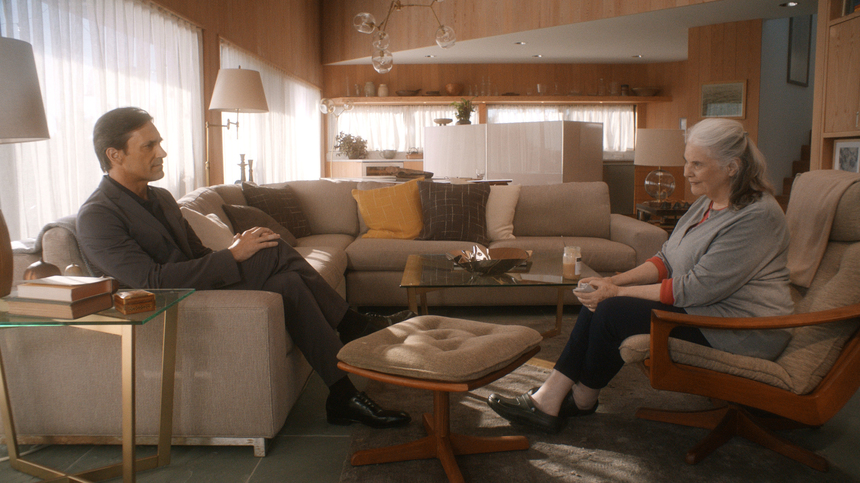Review: MARJORIE PRIME, The Haunting Power of Memory and Love

How much of our personality, our reactions to situations, our relationships with our loved ones, determined by our memories, of them and ourselves? (A somewhat rherotical question, as I think the answer is quite a lot). As we age, and our memories fade or adjust, how we view those from our past changes; sometimes we just remember them as we want, and that can be both good and bad.
Michael Almareyda's film Marjorie Prime, adapted from the Pulitzer-prize nominated play by Jordan Harrison, looks at the effects of age and memory on a mother-daughter relationship. Intimate, loving, strange and highly effective, it watches the negotiations between the family members with calculated caution, exploring very large philisophical questions in a specific and haunting story.
Marjorie (an incredible Lois Smith) is 85 years old, living her twilight years in a lovely home, with the aid of her daughter Tess (Geena Davis) and son-in-law Jon (Tim Robbins). Also in the household is Walter Prime (Jon Hamm), an AI similation of Marjorie's late husband, recreated as he was in his 40s. A kind of therapy to keep Marjorie company, so she can still (to a certain degree) feel his presence and talks of past times, Walter is as Marjorie remembers him (though not necessarily as he really was). Tess, disturbed by the AI, tries to talk to her mother about how life really was, not only with her father, but with her late brother, whose suicide looms over the remaining family like a not-seen AI hiding in the corner.
Whereas in the theatre space, a play/story such as this feeds off the energy of the audience, Almareyda successful transfers this to a greater amount of control and focus on the small facial and body movements of the actors. It only take a few such gestures to know that Tess' lack of warmth, in comparison to Marjorie's loving warmth, might exist because of that warmth. That her dislike of the AI is countered by her husband's embrace of it, and yet this difference is a reason for the success of their marriage.
It's a rare film when actors so readily engage with the camera, where their presence, even in long stretches of scenes with all dialogue and no action, can completely envelope the audience (I think the last timme I was so riveted just by dialogue was with Hunger). Having such an intimate (albeit very nice) space on the big screen, with these medium and close shots, allows the actors to let us become a part of the living space, a part of the world of the characters. This arguably gives the text an entirely different tone that it would have as a stage play.
It's a credit to actors and director that Harrison's dialogue, more precise and yet at the same time evading than usually is found in cinema, comes so naturally; Davis, Smith, Robbins, and Hamm are all doing some of their best work, and Almareyda captures it. Each layer placed upon the next, as each new twist sneaks up on the vieweer, giving you the best kind of chills.
This is the kind of film whose story might seem understated, but its effective is long-lasting (I first saw it in February, and haven't stopped thinking about it since, in the strangest moment of, what do I want or need to remember). Marjorie Prime is a rare, conversation film that still demands to be seen on the big screen, to fully appreciate its performances and its subtle power.
Marjorie Prime
Director(s)
- Michael Almereyda
Writer(s)
- Michael Almereyda
- Jordan Harrison (based on the play by)
Cast
- Jon Hamm
- Geena Davis
- Tim Robbins
- Lois Smith







